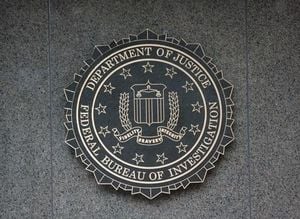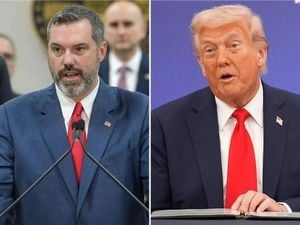On the morning of September 15, 2025, Donald Trump, the sitting president of the United States, unleashed a thunderbolt into the world of American media: a $15 billion defamation and libel lawsuit against The New York Times. The move, announced with characteristic bravado on his Truth Social platform, accused the storied newspaper and four of its reporters of a “decades-long pattern” of “intentional and malicious defamation,” citing both its coverage of the 2024 election and several books published by its journalists.
Trump’s legal filing, which labeled the Times as “a full-throated mouthpiece of the Democrat Party,” offered little in the way of concrete evidence, but much in the way of rhetoric. In his post, he declared, “Today, I have the Great Honor of bringing a $15 Billion Dollar Defamation and Libel Lawsuit against The New York Times, one of the worst and most degenerate newspapers in the History of our Country.” He went further, accusing the publication of “smearing” him and his family, and vowed, “The New York Times has been allowed to freely lie, smear, and defame me for far too long, and that stops, NOW!”
The Times, for its part, did not flinch. In a statement issued the day after the lawsuit was filed, the paper firmly rejected the president’s claims. “It lacks any legitimate legal claims and instead is an attempt to stifle and discourage independent reporting,” a Times spokesperson said, as reported by Nexstar Media. “The New York Times will not be deterred by intimidation tactics.” The paper pledged to “continue to pursue the facts without fear or favor and stand up for journalists’ First Amendment right to ask questions on behalf of the American people.”
By Thursday, September 18, the battle lines had been drawn even more clearly. At the Axios Media Trends Live conference in New York, New York Times executive editor Joseph Kahn didn’t mince words about the Times’ response to the lawsuit. “He’s wrong on the facts. He’s wrong on the law. And we’ll fight it. And we’ll win it,” Kahn told the audience, according to Deadline. Asked if the Times would ever consider settling the case, Kahn’s answer was unequivocal: “No.” He elaborated, “I don’t think the President of the United States should be suing media organizations for libel. Full stop. I think that’s wrong, especially when he’s wrong on the facts, when he’s wrong about the story, when he misunderstands the protections that the law offers to media organizations under the Supreme Court’s interpretation of libel law. And I think it’s incumbent on us to fight to the end.”
Kahn’s confidence was echoed by the Times’ CEO, Meredith Kopit Levien, who spoke at a Financial Times conference the day before. Levien didn’t just call the lawsuit baseless—she framed it as part of a broader, troubling trend. “The lawsuit has no merit. It lacks any legitimate legal claims,” she said. “I believe its purpose is to stifle independent journalism, to deter the kind of fact-based reporting that the Times and other institutions are known for.” Levien went further, comparing Trump’s tactics to those used by governments in countries like Turkey, Hungary, and India: “There is an anti-press playbook at this point... If you look at countries like Turkey and Hungary and India, those countries have elections but they also really work to quash opposition to the regime.” She described the hallmarks of this playbook as “harassment of journalists” and “discrediting of independent journalism,” warning, “it looks like what we’re seeing here.”
Trump’s legal strategy is not new. Over the past year, he has launched lawsuits against several major media organizations, often leading to high-profile settlements. In December 2024, ABC News agreed to pay $16 million over a defamation suit related to anchor George Stephanopoulos’ misstatements. Just seven months later, CBS News’ parent company Paramount reached its own $16 million settlement over a lawsuit against 60 Minutes. Disney, too, has reportedly settled with Trump. Yet the Times has made it clear: it will not be following suit.
Legal experts and media analysts have weighed in, noting that for Trump to prevail in his case, he would need to prove that the Times’ journalists acted with “actual malice” or reckless disregard for the truth—a notoriously high bar set by the Supreme Court’s landmark decision in New York Times Co. v. Sullivan. This ruling, which has underpinned American press freedom for decades, makes it extremely difficult for public figures to win libel cases against news organizations. Kahn referenced this standard directly, emphasizing the robust legal protections the press enjoys under the First Amendment.
The stakes, however, go far beyond the courtroom. For Trump and his supporters, the lawsuit is a rallying cry against what they see as relentless, unfair coverage by a media establishment they view as hostile. Trump’s public comments have repeatedly painted the Times as a partisan actor, particularly after the paper endorsed Democratic presidential nominee Kamala Harris. For others, including many in the media and legal communities, the lawsuit is a dangerous escalation—an attempt to chill independent reporting and intimidate journalists through the threat of massive financial penalties.
Levien, in her remarks, drew a stark parallel between the current moment and the tactics employed by governments in countries where press freedom has been eroded. “What has that anti-press playbook looked like in those places? It’s harassment of journalists, it’s discrediting of independent journalism. And it looks like what we’re seeing here,” she said, as quoted by The Daily Beast. The implication is clear: the outcome of this lawsuit could have ramifications far beyond the fortunes of the Times or Trump himself. It could set a precedent for how aggressively public officials can use the courts to challenge and potentially silence critical media coverage.
For now, the Times appears resolute. Both Kahn and Levien have insisted that the paper will not be cowed, and that it will defend itself vigorously in court. “The New York Times will not be cowed by this,” Levien told the Financial Times conference. “We will continue to pursue the facts without fear or favor.” Kahn, for his part, remains steadfast: “We’ll fight it. And we’ll win it.”
As the legal proceedings move forward, all eyes will be on the courtroom—and on the broader battle over the boundaries of press freedom in America. The outcome, whenever it comes, will almost certainly have lasting implications for the relationship between the country’s leaders and its free press.




